Last year, a client at The Arc Mercer approached Executive Director Steve Cook to confide in him about his struggles feeling accepted in the community. It was an “aha” moment for Steve – and one that led to the creation of what is believed to be among the first initiatives that exists to meet the support needs of individuals with disabilities who identify as LGBTQ.
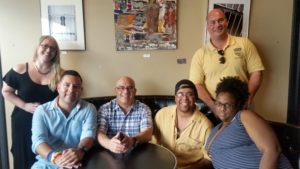
Tell us about the SNAP program and how it came to exist! What type of activities does it involve?
When I realized that someone we served in our agency was struggling with how to successfully integrate into the community as an LGBTQ individual with special needs, I researched other possible resources and found none really existed that comprehensively provided integrated community settings and professional counseling.
I decided The Arc Mercer would commit to developing a program that not only met the needs of someone who identified as LGBTQ with special needs, but that we would share our experiences to allow others to replicate the program.
That is basically how SNAP was formed.
How is the program helping you build a presence and connections/partnerships in your community – both with media and with other organizations?
SNAP has garnered incredible media support due to its unique status as one of the first of its kind in the nation.
As we shared this organization’s mission throughout New Jersey, and the region, we found leaders of other organizations are receiving feedback from their frontline staff about the need for LGBTQ supports for those that they serve. This has led to an incredible surge in awareness by organizational leaders about the need for this type of support.
How do you create that safe space where individuals to feel comfortable participating in the group activities?
One of our first steps was to identify staff within our organization who sympathize with, and support, the mission of SNAP.
This allowed us to build a supportive environment for those we serve to engage in community activities and dynamic professional counseling sessions (through our health care clinic) that focus on creating integrated and safe community events and professional counseling sessions (individual and group), that have evolved into a social environment for members of SNAP to thrive within.
What does the future of the program look like to you?
It is our hope that the framework of our current SNAP organization, including integrated community events, and a comprehensive counseling program (that encourages individuals, their friends and family, and others who identify as LGBTQ with special needs, to openly communicate about how they feel and their goals), will be able to be replicated throughout the nation.
Why do you think establishing groups like this is important? Do you have any advice for other chapters looking to build out programs that address traditionally underserved/under-represented communities like this?
Chapters of The Arc have always strived to find best practices and share them with other chapters nationally.
I think our experiences will allow others to build programs that create safe environments for those we support to be integrated, healthy and safe in the LGBTQ community.
My advice to any chapter looking to replicate our program is to identify those in your organization who support this mission and encourage them to organize events with LGBTQ organizations in local colleges, schools and community organizations.
More importantly, identify counseling resources to support staff, family members and those we serve who identify as LGBTQ.
This may be hard, but thanks to a suggestion by a member of The Arc’s national team (Allen Miller), we are exploring the use of telemedicine (counseling) through our Healthcare Center.
Of course, I am always available to talk directly with anyone who wants to explore forming a similar group at stevencook1@msn.com.


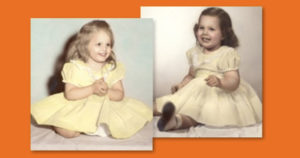 My sister, Rebecca, is sixty years old and one of the most amazing and resilient women I have ever met. When she was born in 1958, autism was barely whispered among doctors. The general public knew nothing about the condition. Becky wasn’t officially diagnosed with autism until she was thirty-seven years old.
My sister, Rebecca, is sixty years old and one of the most amazing and resilient women I have ever met. When she was born in 1958, autism was barely whispered among doctors. The general public knew nothing about the condition. Becky wasn’t officially diagnosed with autism until she was thirty-seven years old.
 The start of a new school year can bring both excitement and anxiety for students and parents, especially for families of students receiving special education supports. Students with disabilities who struggle with change may need extra help making the transition to a new school or teacher.
The start of a new school year can bring both excitement and anxiety for students and parents, especially for families of students receiving special education supports. Students with disabilities who struggle with change may need extra help making the transition to a new school or teacher.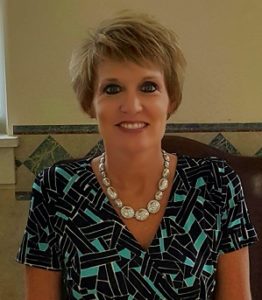 Throughout 2017, The Arc of Kentucky and The Arc of Central Kentucky participated jointly in The Arc’s
Throughout 2017, The Arc of Kentucky and The Arc of Central Kentucky participated jointly in The Arc’s 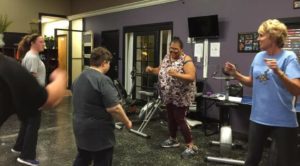
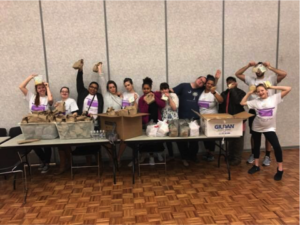 The Arc of South Carolina was awarded a 2017 MLK Day of Service* grant to provide food to members of the local community in need. The chapter decided to focus its activities in Lexington and Richland Counties, which continue to suffer from a lack of access to food and high levels of poverty since a flood in 2015.
The Arc of South Carolina was awarded a 2017 MLK Day of Service* grant to provide food to members of the local community in need. The chapter decided to focus its activities in Lexington and Richland Counties, which continue to suffer from a lack of access to food and high levels of poverty since a flood in 2015.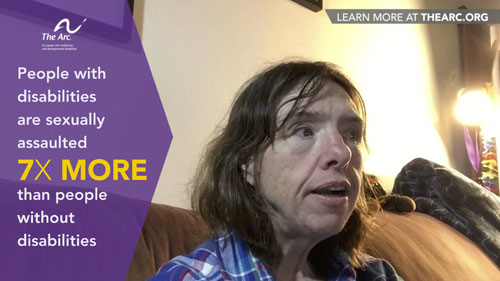 I met this man at a self-advocacy meeting and we had very similar hobbies. I invited Michael back to my house to play chess with me. As soon as Michael entered my house, he started to kiss me and then drag me towards the couch where he proceeded to rape me.
I met this man at a self-advocacy meeting and we had very similar hobbies. I invited Michael back to my house to play chess with me. As soon as Michael entered my house, he started to kiss me and then drag me towards the couch where he proceeded to rape me.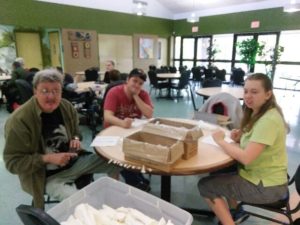 The Arc of Nature Coast partnered with Pasco Elderly Nutrition, which serves more than 800 senior citizens at three community centers in Pasco County through its Meals on Wheels program. To support this program, volunteers from The Arc Nature Coast deliver, prepare and serve food to people in need. More than this, volunteers have developed friendships with their fellow volunteers without disabilities as well as the senior citizens. In fact, after they volunteer, many volunteers with and without disabilities spend time playing cards and games at the senior centers.
The Arc of Nature Coast partnered with Pasco Elderly Nutrition, which serves more than 800 senior citizens at three community centers in Pasco County through its Meals on Wheels program. To support this program, volunteers from The Arc Nature Coast deliver, prepare and serve food to people in need. More than this, volunteers have developed friendships with their fellow volunteers without disabilities as well as the senior citizens. In fact, after they volunteer, many volunteers with and without disabilities spend time playing cards and games at the senior centers.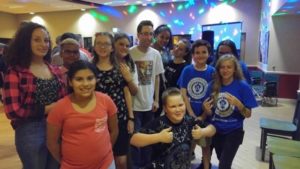 The Arc of Nature Coast partnered with the BETA Club from Fox Chapel Middle School in Spring Hill, Florida. The BETA club first got involved packaging produce for The Arc Nature Coast’s food delivery in January 2017. This club had such a good time that they began attending The Arc Nature Coast’s social events. BETA club members served food and drinks and helped clean up after events, and enjoyed dancing and socializing with people with IDD. Recently, the BETA club received a national volunteer recognition award from the BETA National School of Merit for service with The Arc Nature Coast. To celebrate this awesome achievement, they invited The Arc of Nature Coast staff and people served by the chapter and their families to their dinner dance, and hired “PJ the DJ”, a local self-advocate, to provide the music for the evening.
The Arc of Nature Coast partnered with the BETA Club from Fox Chapel Middle School in Spring Hill, Florida. The BETA club first got involved packaging produce for The Arc Nature Coast’s food delivery in January 2017. This club had such a good time that they began attending The Arc Nature Coast’s social events. BETA club members served food and drinks and helped clean up after events, and enjoyed dancing and socializing with people with IDD. Recently, the BETA club received a national volunteer recognition award from the BETA National School of Merit for service with The Arc Nature Coast. To celebrate this awesome achievement, they invited The Arc of Nature Coast staff and people served by the chapter and their families to their dinner dance, and hired “PJ the DJ”, a local self-advocate, to provide the music for the evening.





